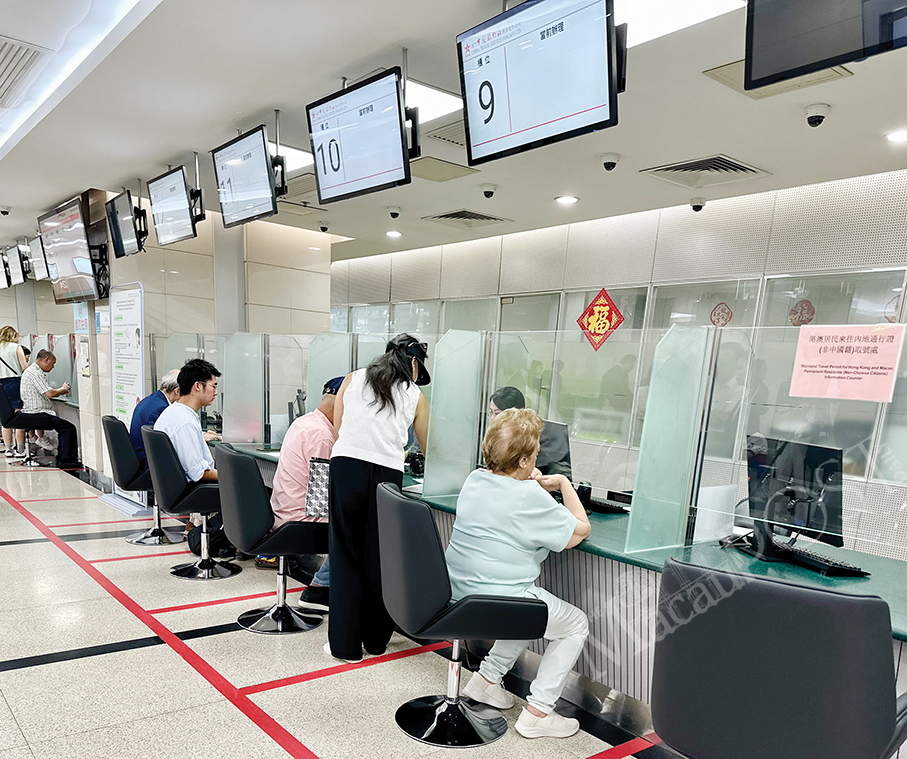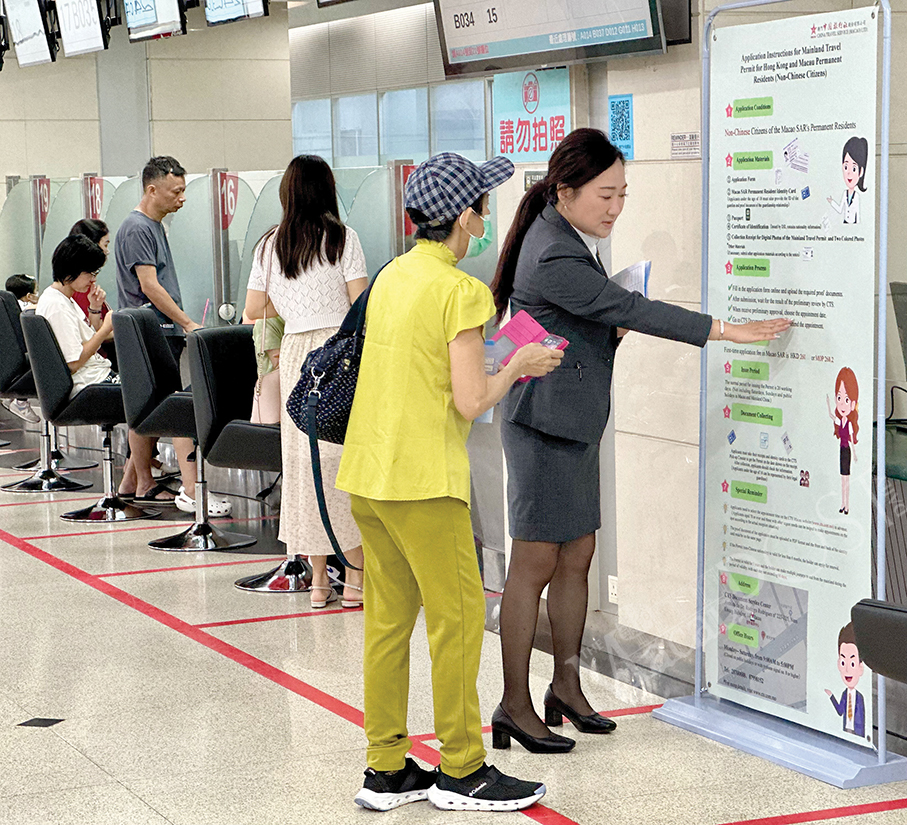Applicants say process ‘quite smooth’
China Travel Service (Macao) Limited at Nam Kwong Building in Zape yesterday started accepting applications from non-Chinese, i.e., foreign permanent residents of Macau for special travel permits to enter mainland China on multiple trips for up to 90 days each time within a five-year validity period, and four applicants, comprising Portuguese, Filipino and Canadian nationals, told reporters separately yesterday morning that the whole process was “quite smooth”, taking not more than 20 minutes to complete, as long as the required documents were well prepared beforehand.
The foreign holders of the new permits, which resemble Chinese nationals’ ID card-like travel permits, shall not work, study or engage in activities such as news reporting while in the mainland.
Speaking to the media yesterday, China Travel Service (Macao) Limited Entry Permit Centre Department Deputy General Manager Conny Chan Kit Mui said that, according to the agency’s appointment system, the number of foreign Macau permanent residents who have made appointments to apply for their mainland travel permit exceeded 400 as of yesterday morning.
“It is estimated that about 30 would turn up today [yesterday]”, Chan added, pointing out that most of the 400 registered applicants were Portuguese and Malaysian nationals, accounting for about 45 and 40 percent of the total appointments, respectively.
Chan underlined that up to 100 appointments per day will be accepted.
According to Identification Services Bureau (DSI) data, there were about 19,500 non-Chinese permanent residents in Macau at the end of last year, some 2.85 percent of the total population of 683,700 at the end of last year.
According to Chan, in order to meet the requirements of the National Immigration Administration (NIA) and the expected demand for the new permits, China Travel Service (CTS) has increased its human resources, including staff with knowledge of Portuguese and English, to provide assistance to people of different nationalities.
Chan said that all the applicants can now make their appointment by filling in the application form and uploading the required documents, including a photo of their Macau ID card and foreign passport, as well as their “Certificate of Personal Data” issued by the Identification Services Bureau (DSI) within six months prior to the date of application, via its website at www.cts.com.mo, before they can process their application in person at CTS within 28 days from the date of application: “Even if they didn’t make an appointment online, if they walk in, we’ll help them solve their problems, as long as they have all the documents with them that they need”.
Chan reminded all the applicants to bring along their Macau permanent ID card, ordinary passport with a validity period of no less than six months and the DSI’s “Certificate of Personal Data”, as well as two recent ID photos complying with the NIA guidelines and a receipt proving that their photos were taken no more than six months ago.
Generally speaking, according to Chan, the processing period for acceptance, approval and issuance of the permits is 20 working days.
On the first day of the new measure yesterday, China Travel Service (Macao) Limited welcomed its first non-Chinese Macau permanent resident, Henrique Saldanha, at 9:30 a.m.
Saldanha, a Portuguese national who has been living in Macau for 42 years, told reporters after his application that the measure was a “great opportunity” for him and his family to travel around mainland China without any restrictions: “The fact that I’ve got this permit now is a plus in terms of my chances of getting to know [mainland] China better”.
Saldanha, who works as a lawyer, used to visit the mainland only once or twice a year, mainly on business trips, and his stays were not very long, but now, after obtaining his permit, he can explore the mainland with his family.
Saldanha’s wife, Amélia António, who moved to Macau in 1982 from Portugal, said that the new measure could speed up foreign Macau permanent resident’s knowledge of mainland China as the permit would make it easier for them to travel to the mainland anytime “to feel the development” there: “I think that is very useful and I think we’ll be very grateful to [the National Immigration Administration] to go ahead with this kind of adjustment and the measures so that we [can] feel more at home, have more space and get more integrated”. António, president of Macau’s Portuguese community association “Casa de Portugal” (“Portugal’s House”), also said that with the new measure, permanent residents from the Portuguese community in Macau can travel to mainland China more easily, quickly and conveniently, anytime anywhere.
A Canadian national surnamed Cheang, who used to travel to the mainland five to seven times a year, said that the measure was very convenient for him as it saves him time and money in visiting his relatives in the mainland: “In the future, it will be more convenient for me to cross the border to the mainland without having to queue up for so long or apply for a visa…… In the past, it took about an hour to cross the border through the Barrier Gate checkpoint, hopefully, it will be reduced to within 15 minutes [with the new mainland travel permit]”. Cheang also said he would travel to Zhuhai to visit relatives and friends there as soon as he gets the permit.
John Capuz, a Filipino who has been living in Macau for over 30 years and used to visit the mainland with his family and friends once a week for meals, also said that the permit would make it more convenient for non-Chinese permanent Macau residents to easily access mainland China: “If you use a visa to cross the border, it will take longer and you have to wait for confirmation from the [mainland] Chinese [immigration services], but it will now be more convenient to cross the border if you have obtained a permit, and it will be easier to enter [the mainland as you can cross the border via the checkpoints’ e-channels]”.
However, Capuz was unable to apply for the permit yesterday as he did not take all the required documents with him.
Hitherto, most of Macau’s foreign permanent and non-permanent residents could only enter the mainland by travelling on their passports and after obtaining an entry visa, with the exception of foreign nationals exempted from the visa requirement, such as nationals from Germany, France, Italy and Spain.
The implementation of the new measure aims to further promote extensive exchanges and movement of people between the mainland, Hong Kong and Macau, and facilitate the smooth conduct of business, trade and investment, cultural tourism, education and scientific research activities, according to a recent NIA statement issued in anticipation of yesterday’s formal start of the new measure.

This photo taken yesterday shows foreign permanent Macau residents, who have made their appointment online, applying for their special mainland travel permits at four dedicated service counters at China Travel Service (Macao) Limited on the first floor of Nam Kwong Building in Zape. – Photo: Yuki Lei

This photo taken yesterday shows China Travel Service (Macao) Limited staff explaining to a non-Chinese permanent Macau resident how to apply for a special travel permit to enter mainland China. – Photo: Yuki Lei






